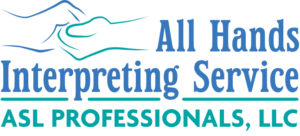When you First Meet your Interpreter
It’s totally fine to introduce yourself to the interpreter, but during the appointment, address the deaf or hard-of-hearing person directly, not the interpreter unless you need clarification. Maintain eye contact with your client or patient. Give extra time when referencing visuals so the deaf person can navigate between the interpreted information you are giving and the visual you are showing them.
What will the Interpreter Interpret?
The interpreter is ethically obligated interpret everything in the room they hear, including sounds, side comments, and visual information if the client is DeafBlind. If you wish to have a private conversation, please step out of the room. The interpreter is bound to confidentiality for all participants involved and cannot remind or convey information to others outside of the room or be expected to hold information for any participant if they are unavailable to communicate with directly (ie. if they are filling out paperwork or have stepped out of the room).
Relating with the Client
Be yourself. The interpreter may step out of first person interpretation to ask for clarification or if they need you to slow down or repeat something. Otherwise, speak at a normal pace, and remember that the ASL interpreter will usually be interpreting simultaneously with a slight lag time. Allow time for the Deaf/hard-of-hearing person to respond or ask questions.
At times, if a cultural explanation is required, the interpreter may take a little longer to expand or ask you directly to more fully explain an unfamiliar concept.
Asking Questions
If you have cultural questions, or questions about the person’s language or preferences, please ask the Deaf or hard-of-hearing person directly. The interpreter is available to provide more general cultural context explanation as needed, but this may or may not directly apply to this particular Deaf or hard-of-hearing individual. For example, most culturally Deaf people prefer the term “Deaf” rather than “Hearing Impaired,” but if you are unsure, you can ask.
Again, the interpreter’s goal is to ensure that all parties understand each other and are able to communicate what they want to. Don’t hesitate to ask for clarification as needed.
The Ethical Obligations of the Interpreter
The interpreter is not a friend or family member of the deaf participant, but is a professional who may also be meeting your patient/client for the first time or the two-hundredth time, but will maintain a professional impartial demeanor regardless.
The interpreter is not responsible to convey information to other people but is bound by confidentiality to whoever is in the room.
The interpreter will not interject or share their own opinion, but interpret for all parties with impartiality.
The interpreter cannot act as a witness or take on another role while interpreting (i.e. teacher, authority, coach, caretaker).
Our ASL interpreters abide by the : Registry of Interpreters for the Deaf (RID) Code of Professional Conduct

